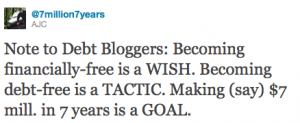 This is the view from my tennis court (taken just as the house was almost ready to move into). Which neatly brings me to Budgets are Sexy, who asks: “do you you still want to live in a mansion?”
This is the view from my tennis court (taken just as the house was almost ready to move into). Which neatly brings me to Budgets are Sexy, who asks: “do you you still want to live in a mansion?”
D’uh, yeah!
The problem is that the example that he cites is so far away from being a mansion, that it barely qualifies as my second house which, BTW, I am still trying to get rid of!
On the other hand, this guy is carrying a monthly mortgage payment of $2,200 which, at 4.75%, means roughly a $450k loan, plus his equity of $500k (now) to $1.2million (pre bubble) means that his idea of a ‘mansion’ is a house b/w $1 million and $2 million. About the same value as my house in the USA.
Oh, and I paid cash for both of my houses.
The point here is not to brag, that would be unseemly and [AJC: I know it’s hard to believe from what you read here] is a little out of character. The point is to set your expectations, particularly if your Number points you to a similar $7 Million 7 Year lifestyle.
Look, a $1 – $2 million house is nice, and in a poor area, where land and building costs are cheap, it may very well qualify as a ‘mansion’ …
… but, in a reasonable area, I don’t even think that my new house qualifies as a ‘mansion’ – well, IMHO, barely – yet it cost $5million+ and has a tennis court, heated swimming pool, home theater, sauna room, and each bedroom has it’s own study and en-suite!
Having said that, I agree that the running costs are huge: you can’t wash this many windows and glass balcony panels yourself (we spent $50k+ to install the glass panels plus another $70k on glass windows and doors, alone); you can’t clean a house this big yourself (we have a cleaning lady almost 2 full days a week); you can’t garden a place this big yourself (well, you probably could, but I hate gardening); and, imagine the cost of heating, cooling, and lighting the damn house.
But, if you have the money to live your Life’s Purpose (without ever needing to work again), you give back in more ways than one, and you still have enough money left over to buy the house of your dreams … then I can highly recommend getting the mansion …
… so far, it’s everything it’s cracked up to be 🙂






